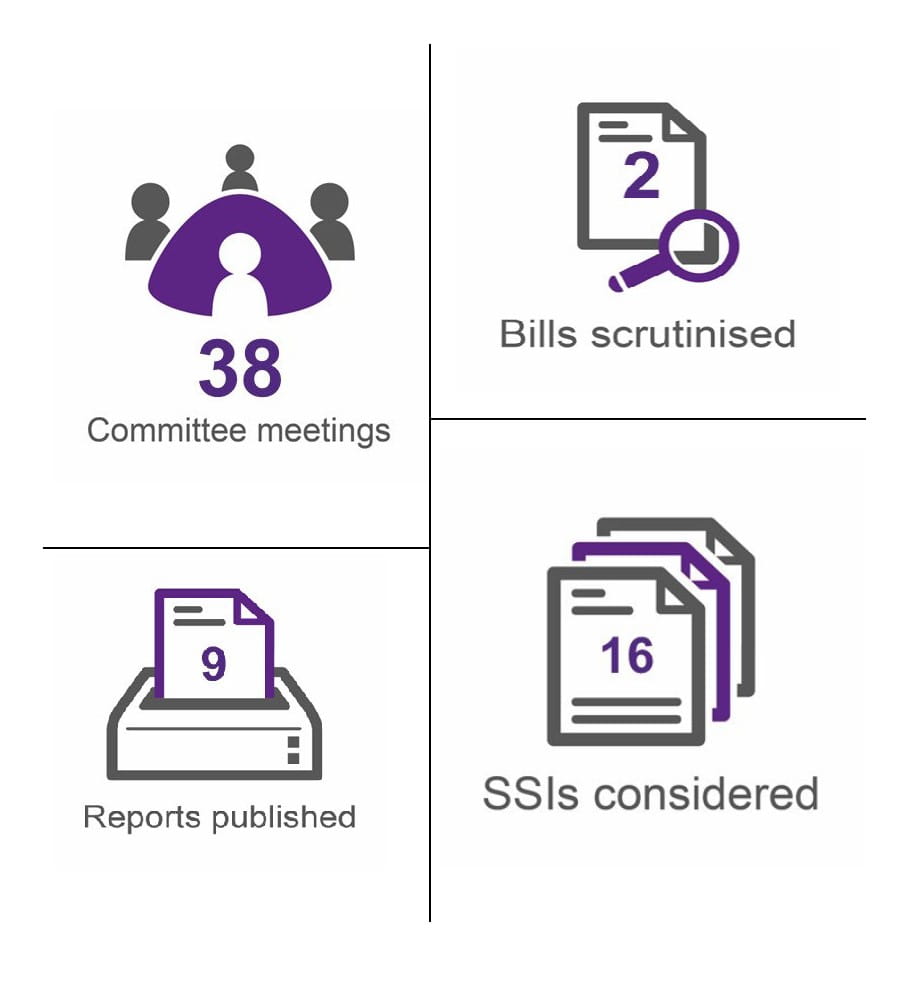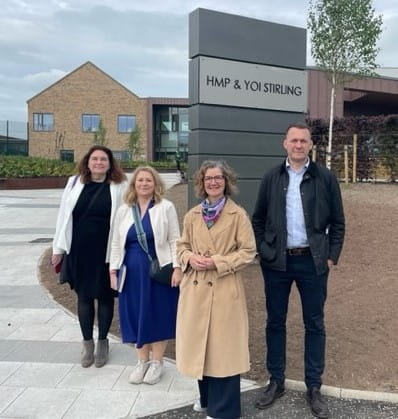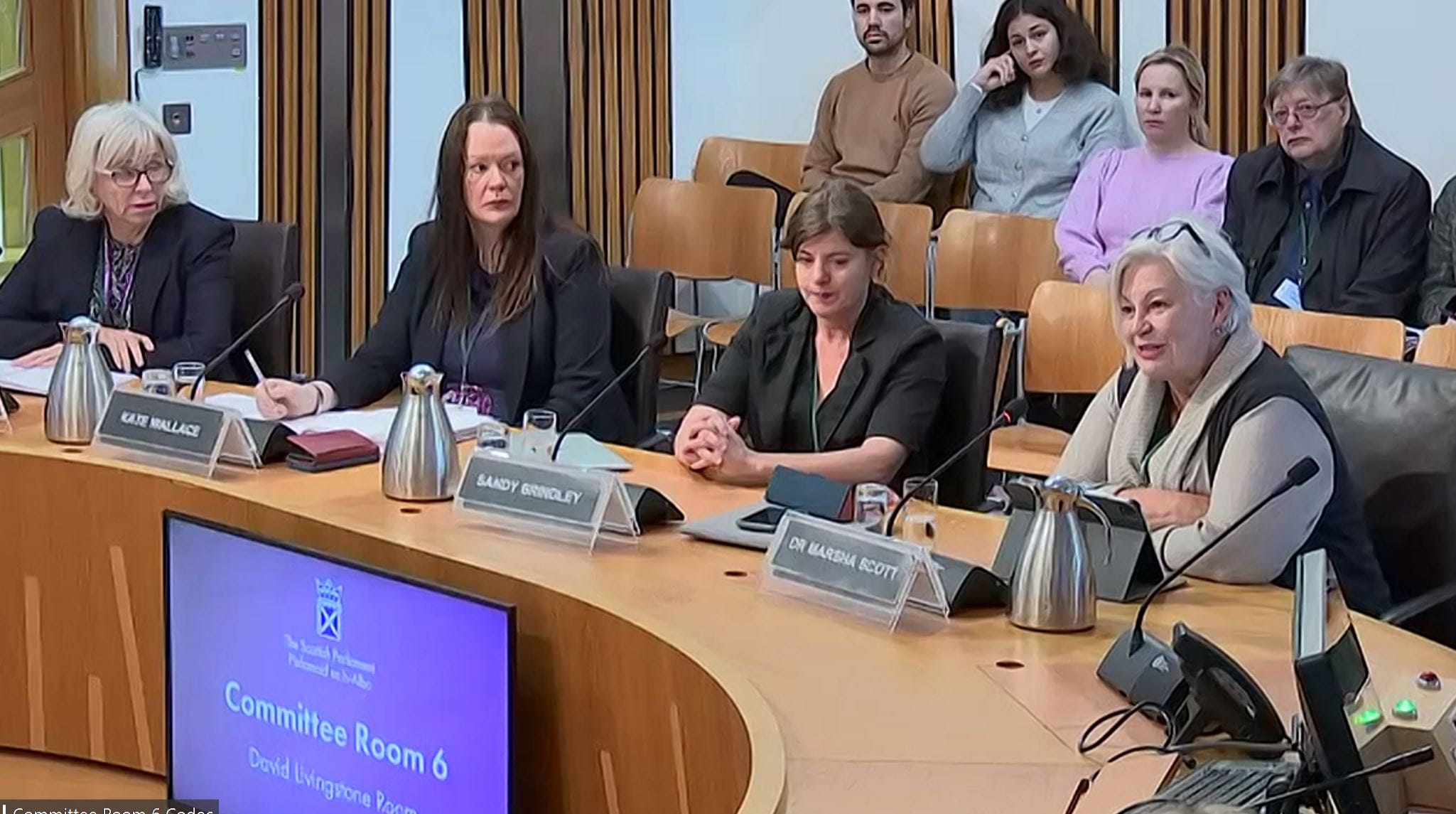Criminal Justice Committee
Annual Report of the Criminal Justice Committee 2023-24
Introduction
This report outlines the work of the Criminal Justice Committee ("the Committee") during the Parliamentary year from 13 May 2023 to 12 May 2024.
During this period, John Swinney MSP replaced Collette Stevenson MSP as a member of the Committee on 29 June 2023. Sharon Dowey MSP also replaced Jamie Greene MSP on 29 June 2023.
Meetings and visits
The Committee held 38 meetings over this period. Nine meetings were held entirely in public, three meetings were held entirely in private, and 26 meetings were partly in private. Most items taken in private were to consider draft reports or the Committee's work programme.

Additionally, members of the Committee met jointly with a selection of members from the Health, Social Care and Sport Committee and the Social Justice and Social Security Committee for the purposes of scrutinising the efforts to reduce the number of drug deaths in Scotland. This cross-committee working saw members meet on three occasions during this period.
When not meeting, members of the Committee are keen to visit various institutions and organisations within the criminal justice remit, such as the visit in May 2023 to the new HMP & YOI Stirling for women prisoners.

Legislation
Bills
Victims, Witnesses, and Justice Reform (Scotland) Bill
The Victims, Witnesses, and Justice Reform (Scotland) Bill proposes changes to the law to try to improve the experience of victims and witnesses in the justice system, as well as other significant reforms. The changes proposed include creating a new Victims and Witnesses Commissioner for Scotland; removing the verdict of not proven in criminal cases and reducing the size of juries from 15 to 12 with a majority for a guilty verdict set at 8; the establishment of a new Sexual Offences Court; and the piloting of judge-only trials for rape cases without a jury.
The Victims, Witnesses, and Justice Reform (Scotland) Bill was introduced into the Parliament by Angela Constance MSP, Cabinet Secretary for Justice and Home Affairs on 25 April 2023.
In this reporting year, the Committee undertook Stage 1 scrutiny of the Bill. This was a major piece of work. The Committee heard 36 hours of oral evidence, over 14 separate meetings. There were 262 responses to the call for views. The Stage 1 report was published on 29 March 2024 and was over 200 pages long.

The Stage 1 report addressed each of the proposals in turn and reached conclusions on their merits and, on occasion, made recommendations for improvements.
Throughout the report the Committee referred to the important evidence received from survivors of crime. The Committee would like to thank all those survivors who gave evidence. Their evidence was very helpful in shaping Members' thinking about the Bill.
The Committee was content to agree the general principles of the Bill at Stage 1. The Bill contains proposals which are intended to improve the justice system for victims and witnesses. However, not every Member supported every proposal in the Bill. For some Members, the final composition of the Bill at Stage 3 will ultimately determine whether they are able to support it.
Police (Ethics, Conduct and Scrutiny) (Scotland) Bill
The Committee is the lead committee on the Police (Ethics, Conduct and Scrutiny) (Scotland) Bill and is currently undertaking Stage 1 evidence. The Bill makes provision about the ethical standards of the Police Service of Scotland, procedures for dealing with and, the consequences of, certain conduct by constables and how policing in Scotland is scrutinised.
The provisions in the Bill include the introduction of a statutory code of ethics and duty of candour for police officers, measures to deal more effectively with misconduct and gross misconduct by officers, measures to improve vetting, and increased powers for the independent Police and Investigations Review Commissioner.
The intention is to ensure that there are robust, clear and transparent mechanisms in place for investigating complaints, allegations of misconduct, or other issues of concern in relation to the conduct of police officers in Scotland.
As part of its scrutiny of the Police (Ethics, Conduct and Scrutiny) (Scotland) Bill, the Committee heard formal and informal evidence from people with experience of making complaints and from an officer who was the subject of a complaint.
The Committee also heard from the Rt. Hon Lady Elish Angiolini KC, who chaired the Independent Review of Complaints Handling, Investigations and Misconduct in Relation to Policing. The Bill seeks to introduce the majority of the Review’s legislative recommendations.
Fireworks and Pyrotechnic Articles (Scotland) Act
The Committee continues to track the implementation of the Fireworks and Pyrotechnic Articles (Scotland) Act which was passed by the Parliament in June 2022.
The most recent updated from the Scottish Government was considered on 3 November 2023, with an update from the Minister for Victims and Community Safety on the Government's efforts to raise awareness around the misuse of pyrotechnic devices.
Subordinate legislation
During the parliamentary year, the Committee considered 16 Scottish Statutory Instruments, 12 of which were negative instruments and four were affirmative instruments. The affirmative SSIs were as follows:
The International Organisations (Immunities and Privileges) (Scotland) Amendment Order 2023
The Police Negotiating Board for Scotland (Constitution, Arbitration and Qualifying Cases) Regulations 2023
The International Organisations (Immunities and Privileges) (Scotland) Amendment (No. 2) Order 2023
Coronavirus (Recovery and Reform) (Scotland) Act 2022 (Extension and Expiry of Temporary Justice Measures) Regulations 2023
Several negative SSIs in particular received a great deal of attention when considered by the Committee, namely the:
Gender Recognition (Disclosure of Information) (Scotland) Order 2023 (on 11 January 2024)
Prisons and Young Offenders Institutions (Scotland) Amendment Rules 2023 (on 11 January 2024)
Dangerous Dogs (Designated Types) (Scotland) Order 2024 (on 21 February 2024)
Dangerous Dogs (Compensation and Exemption Schemes) (Scotland) Order 2024 (on 27 March 2024)
The SSIs were approved by the Committee after debate.
Legislative Consent Memoranda
The Committee considered four legislative consent memoranda and three supplementary legislative consent memoranda on the following UK Parliament Bills during the parliamentary year:
The Economic Crime and Corporate Transparency Bill
The Northern Ireland Troubles (Legacy and Reconciliation) Bill
The Online Safety Bill
The Investigatory Powers Amendment Bill
The Criminal Justice Bill
Inquiries/case studies
Policing and mental health
The Committee continued its scrutiny of policing and mental health. This includes consideration of the impact on police officers who deal with people with mental health issues and the response by Police Scotland to police officers who seek support for their own mental health and wellbeing.
Throughout the reporting year, the Committee wrote to policing bodies, police unions and staff associations, and the Scottish Government to seek further information on the work being done to support the mental health and wellbeing of police officers, and to address the demands being placed upon them.
The Committee received a report from the Scottish Police Authority (SPA) on the work it had requested the SPA to undertake to understand the nature and scale of concerns police officers and staff have about the advice and support available to them when they experience mental health and well-being issues. The SPA indicated that an independent professional assessment of Police Scotland’s approach to well-being has been commissioned and is expected to report to the Authority in Summer 2024.
The Committee focussed on the issue of police officer suicides. Members sought a reassurance from policing bodies that all police officer suicides are investigated to understand whether any workplace pressures were a contributory factor, that relevant data is gathered, and that lessons are learned.
On 15 November 2023, the Committee took evidence from HM Inspectorate of Constabulary in Scotland on HMICS’s report on its Thematic Review of Policing Mental Health in Scotland. The thematic review assessed the state, efficiency and effectiveness of Police Scotland’s provision of mental health-related policing services.
Budget scrutiny
In the autumn of 2023, the Committee conducted its scrutiny of the justice budget for 2024/25 proposed by the Scottish Government. The key focus was on the financial challenges that face organisations working in the criminal justice sector and the adequacy of budgets that may be proposed when the Scottish Government publishes its budget. The pressures on capital spending and investment were of particular interest to the Committee.
The Committee outlined its recommendations in a letter to the Cabinet Secretary for Justice and Home Affairs.
Case studies: innovative practices and impact
In addition to the above work, the Committee would like to highlight the following case studies which demonstrate the impact of its work and innovative practices.
| The Committee adopted a novel approach to its scrutiny of the Victims, Witnesses and Justice Reform (Scotland) Bill. The Committee agreed that it would be important to take the time to consider all the main provisions in the Bill in a thorough and balanced way. However, the size and multi-purpose nature of the Bill was a challenge. For example, time constraints meant it would not have been realistic to ask a panel of witnesses questions about all the proposals in the Bill in a single evidence session.For this reason, the Committee took a novel 'phased' approach to its consideration of the Bill. It divided the Bill into more manageable segments for the purposes of Stage 1 and considered these separately, one after the other, in relation to the various Parts of the Bill. This meant that there was 'ring-fenced' time for the scrutiny of each of the main provisions and the evidence sessions were more focused. |
| Throughout the reporting year, the Committee has scrutinised the case for improving access to the transcripts of their court cases for survivors of rape and sexual offences. Specifically, the Committee looked at the current costs associated with requests and has campaigned with Hannah Stakes, Ellie Wilson and other survivors for the Scottish Government and the Scottish Courts and Tribunals Service to provide these for free. In October 2023, the Cabinet Secretary for Justice and Home Affairs confirmed by letter that she would launch a pilot scheme to bring this about. |
| As part of a joined-up approach to tackle drug harm, the Criminal Justice, Health, Social Care and Sport, and Social Justice and Social Security Committees have met jointly since February 2022, to consider the efforts being made to reduce drug deaths. This approach reflects the need to consider aspects of the criminal justice system, as well as health policies and wider social and economic matters such as poverty, unemployment, unstable housing, and family breakdown.Members of the three committees met three times during the reporting year. They met on 26 September and 2 November 2023, and on 1 May 2024. An issue which the Members of the three committees considered from the outset was the proposed introduction of safer drug consumption facilities in Scotland. In particular, the proposal for a safer drug consumption facility pilot in Glasgow. On 11 September 2023, the Lord Advocate wrote to the cross-committee members, as follows:“I can confirm that were a facility, of the type described in the documents which I have been provided with, to open as a pilot in Glasgow, then I would be prepared to publish a statement of prosecution policy to the effect that it would not be in the public interest to prosecute users of that facility in terms of section 5(2) of the Misuse of Drugs Act 1971 for simple possession offences committed within the confines of the facility”. |
Devolution of justice in Wales
On 25 January 2024, the Convener and Deputy Convener were pleased to meet with Mick Antoniw MS, Counsel General and Minister for the Constitution for Wales, who was visiting the Scottish Parliament to discuss the justice system and justice reform in Wales.
Equal opportunities
The Committee’s main area of interest in relation to its work and equal opportunities has been its focus on the consideration of the ways to improve the way that rape and serious sexual offence cases are handled in court and also the treatment of victims and survivors. Details of our work in these areas are set out elsewhere in this Annual Report.
As part of its scrutiny of the Victims Bill referred to above, the Committee decided to produce an easy-read version of its call for views to try to facilitate access to as many people as people in the consultation.
Post legislative scrutiny
Due to legislative workload, the Committee has not been able to undertake any post-legislative scrutiny in the parliamentary year. As time allows, the Committee will consider whether to launch any new inquiries.
The Convener of the Committee was honoured to meet with international delegations from Zambia and Malawi who visited the Scottish Parliament to discuss the Committee's approach to post-legislative scrutiny (PLS) as part of a wider visit to the UK sponsored by the Westminster Foundation for Democracy.

Similarly, the Convener and other MSPs from other parliamentary committees met in November 2023 with a delegation of elected members and officials from the Parliament of Albania to discuss respective approaches to PLS.